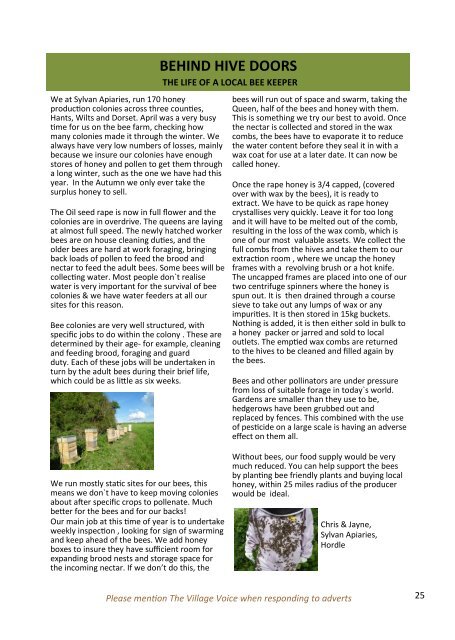The Village Voice June July 2018
You also want an ePaper? Increase the reach of your titles
YUMPU automatically turns print PDFs into web optimized ePapers that Google loves.
We at Sylvan Apiaries, run 170 honey<br />
production colonies across three counties,<br />
Hants, Wilts and Dorset. April was a very busy<br />
time for us on the bee farm, checking how<br />
many colonies made it through the winter. We<br />
always have very low numbers of losses, mainly<br />
because we insure our colonies have enough<br />
stores of honey and pollen to get them through<br />
a long winter, such as the one we have had this<br />
year. In the Autumn we only ever take the<br />
surplus honey to sell.<br />
<strong>The</strong> Oil seed rape is now in full flower and the<br />
colonies are in overdrive. <strong>The</strong> queens are laying<br />
at almost full speed. <strong>The</strong> newly hatched worker<br />
bees are on house cleaning duties, and the<br />
older bees are hard at work foraging, bringing<br />
back loads of pollen to feed the brood and<br />
nectar to feed the adult bees. Some bees will be<br />
collecting water. Most people don`t realise<br />
water is very important for the survival of bee<br />
colonies & we have water feeders at all our<br />
sites for this reason.<br />
Bee colonies are very well structured, with<br />
specific jobs to do within the colony . <strong>The</strong>se are<br />
determined by their age- for example, cleaning<br />
and feeding brood, foraging and guard<br />
duty. Each of these jobs will be undertaken in<br />
turn by the adult bees during their brief life,<br />
which could be as little as six weeks.<br />
We run mostly static sites for our bees, this<br />
means we don`t have to keep moving colonies<br />
about after specific crops to pollenate. Much<br />
better for the bees and for our backs!<br />
Our main job at this time of year is to undertake<br />
weekly inspection , looking for sign of swarming<br />
and keep ahead of the bees. We add honey<br />
boxes to insure they have sufficient room for<br />
expanding brood nests and storage space for<br />
the incoming nectar. If we don’t do this, the<br />
BEHIND HIVE DOORS<br />
THE LIFE OF A LOCAL BEE KEEPER<br />
bees will run out of space and swarm, taking the<br />
Queen, half of the bees and honey with them.<br />
This is something we try our best to avoid. Once<br />
the nectar is collected and stored in the wax<br />
combs, the bees have to evaporate it to reduce<br />
the water content before they seal it in with a<br />
wax coat for use at a later date. It can now be<br />
called honey.<br />
Once the rape honey is 3/4 capped, (covered<br />
over with wax by the bees), it is ready to<br />
extract. We have to be quick as rape honey<br />
crystallises very quickly. Leave it for too long<br />
and it will have to be melted out of the comb,<br />
resulting in the loss of the wax comb, which is<br />
one of our most valuable assets. We collect the<br />
full combs from the hives and take them to our<br />
extraction room , where we uncap the honey<br />
frames with a revolving brush or a hot knife.<br />
<strong>The</strong> uncapped frames are placed into one of our<br />
two centrifuge spinners where the honey is<br />
spun out. It is then drained through a course<br />
sieve to take out any lumps of wax or any<br />
impurities. It is then stored in 15kg buckets.<br />
Nothing is added, it is then either sold in bulk to<br />
a honey packer or jarred and sold to local<br />
outlets. <strong>The</strong> emptied wax combs are returned<br />
to the hives to be cleaned and filled again by<br />
the bees.<br />
Bees and other pollinators are under pressure<br />
from loss of suitable forage in today`s world.<br />
Gardens are smaller than they use to be,<br />
hedgerows have been grubbed out and<br />
replaced by fences. This combined with the use<br />
of pesticide on a large scale is having an adverse<br />
effect on them all.<br />
Without bees, our food supply would be very<br />
much reduced. You can help support the bees<br />
by planting bee friendly plants and buying local<br />
honey, within 25 miles radius of the producer<br />
would be ideal.<br />
Chris & Jayne,<br />
Sylvan Apiaries,<br />
Hordle<br />
Please mention <strong>The</strong> <strong>Village</strong> <strong>Voice</strong> when responding to adverts<br />
25


















